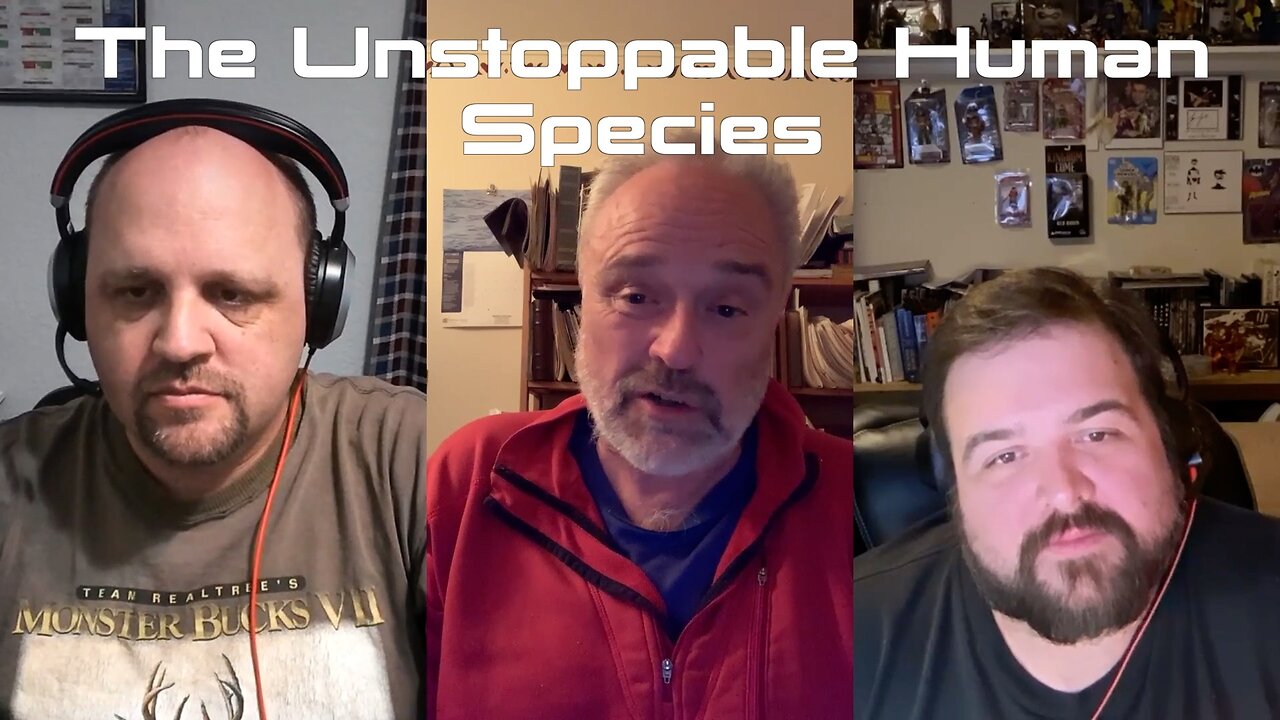Premium Only Content

Ep 32 - The Unstoppable Human Species w/ John Shea
Join us on Twitter @afraid_to_ask
Support us on Patreon: patreon.com/user?u=46411437
Join us on Minds - https://www.minds.com/afraidtoask/?referrer=afraidtoask
Join us on Discord: https://discord.gg/q3a4s39BPC
Join us on Facebook: https://m.facebook.com/profile.php?id=100091482060505
Summary
John Shea discusses survival archaeology and the importance of understanding the survival skills and techniques of early humans. He emphasizes the need to ask questions about how early humans made fire, found food, and created shelter, rather than focusing on who made specific tools. Shea challenges assumptions about the differences between Neanderthals and Homo sapiens, highlighting the potential for cooperation and cultural exchange between different groups. He also explores the impact of sea level rise on ancient coastlines and the challenges of studying ancient landscapes. Overall, Shea encourages a holistic and practical approach to understanding human survival and adaptation throughout history. In this conversation, John Shea discusses various aspects of human history and archaeology. He highlights the cultural connections and cooperation between different groups of people, emphasizing that humans find ways to get along despite perceived differences. He also explores population movements and migration, challenging the assumption that migrations were common in prehistoric times. Shea delves into the significance of the Clovis culture and the establishment of symbolic networks for mate choice. He also discusses the mistakes made in stone tool making and the cleverness of early humans. The conversation concludes with a focus on the importance of experimental archaeology in understanding the past. In this conversation, John Shea discusses his expertise in survival archeology and survival classes. He explores how people in prehistoric times solved different difficulties and shares his own experiences in survival training.
Takeaways
- Humans have a remarkable ability to find ways to get along and cooperate, even across cultural and linguistic differences.
- Migration was not as common in prehistoric times as previously assumed, and population movements were often a mixture of individuals dispersing and people moving along to assist.
- The Clovis culture and the production of distinctive stone tools played a role in establishing networks and wider choices of mates.
- Mistakes in stone tool making are common and can provide valuable insights into the skills and challenges faced by early humans.
- Experimental archaeology is a valuable tool for understanding the past and challenging assumptions made in the field.
Chapters
00:00 Introduction and Background
03:00 Survival Archaeology and its Origins
06:00 The Importance of Survival Skills
09:00 The Evolution of Stone Tools
12:00 Dispersal and Migration
15:00 The Impact of Sea Level Rise
19:00 Human Adaptation and Survival
23:00 The Unique Traits of Homo Sapiens
26:00 The Importance of 'How' over 'Who'
29:00 Avoiding Trivial Differences and Assumptions
33:00 Cooperation and Hyper-Sociality
38:15 Cultural Connections and Cooperation
41:12 Population Movements and Migration
42:27 The Clovis Culture and Symbolic Networks
45:19 Establishing Networks for Mate Choice
49:03 Mistakes in Stone Tool Making
52:09 The Cleverness of Early Humans
56:38 The Significance of Clovis Points
01:00:07 Evidence of Stone Tool Making Mistakes
01:03:07 The Importance of Experimental Archaeology
01:10:37 The Rise of Experimental Archaeology
01:13:29 Challenging Assumptions in Archaeology
01:14:28 Surviving Prehistory
-
 4:21:19
4:21:19
Steven Crowder
15 hours agoLIVE: LA Riots Coverage | Boots on the Ground!
677K547 -
 1:30:50
1:30:50
The Sage Steele Show
20 hours agoShannon Bream | The Sage Steele Show
8.59K2 -
 4:01:36
4:01:36
FreshandFit
5 hours agoAfter Hours w/ Zherka
141K60 -
 2:20:58
2:20:58
Badlands Media
13 hours agoDevolution Power Hour Ep. 362: Game Theory, Traps, and Trump’s Calculated Chaos
225K19 -
 2:23:18
2:23:18
Inverted World Live
7 hours agoAlien Caskets in Antarctica | Ep. 57
47.4K9 -
 2:32:50
2:32:50
TimcastIRL
8 hours agoTrump To Deploy ICE Tactical Units Across US As LA Riots WORSEN, HUNDREDS Arrested | Timcast IRL
138K107 -
 7:14:47
7:14:47
ZerrickGaming
9 hours agoPlaying Tainted Grail! Lets Explore this cursed land!
56.3K1 -
 3:04:30
3:04:30
I_Came_With_Fire_Podcast
17 hours agoRIOT SEASON IS BACK! | CCP Smuggler 2.0 | Texas Going Blue? | China Trade Talk
46.7K2 -
 1:00:41
1:00:41
Omar Elattar
9 hours ago“I Was Homeless On NYC Streets!” - Tequila CEO Shares Her Multi-Million Dollar Story
90.7K4 -
 1:51:20
1:51:20
The Pascal Show
6 hours ago $4.55 earnedRIOTS NATIONWIDE?! Anti-ICE Protests Throughout The Country! LA, NYC & More Absolute Chaos!
57.9K4